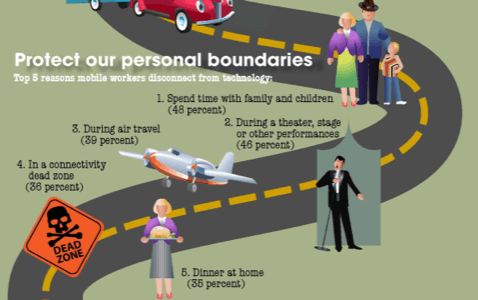The latest global mobile workforce survey from economic trends analysis firm iPass reveals a trend that we probably noticed but tucked away in our Outlook agendas or Google calendars for some time later: Mobile workers worldwide are working longer hours. But they feel empowered by the mobile devices that enable them to do so, and they’re apparently happy with the results.

So if you have a spouse and/or kids whom you may have neglected in the past month, well, shut off your iPad and pay attention.
As iPass spokesperson Kate Blatt told RWW this afternoon, the firm surveyed some 85,000 individuals, receiving 3,000 responses from people identifying themselves as mobile workers. Some 19% of those respondents hail from IT, while 27% come from the R&D trades (including engineers, architects, doctors, mechanics), 20% from sales, and 6% from marketing.
Of those respondents, according to iPass analyst John Gallagher, some 38.3% say they use mobile technology to do some amount of work during the early morning hours prior to their commute to work. Some 24.7% do some level of work during the commute, and 36.6% say they actually end up working through their lunch hour. Once they finally get home, 26.6% of respondents say they go back to doing some work remotely after they’ve eaten dinner, and 18.8% tuck the kids in bed and then go back to work again.
Only 43.1% of mobile workers surveyed said they never work in the middle of the night.
Is it because there’s simply too much work to be done? Is work not getting done efficiently enough? Or is the allure of mobile devices simply more compelling than, say, food? Family? Friends (not counting Facebook)?
We asked iPass spokesperson Kate Blatt.
“From the feedback in the survey, many feel that mobility makes them more efficient and enables them to be flexible,” Blatt tells RWW. “With flexibility comes control of when and where you work, and an expectation that you are available all the time, even on vacation. I think it is the new lifestyle that is sweeping the world… and there are trade-offs. People are willing to put in more hours, and be more productive in exchange for leaving the office at 4 pm to coach your kids’ soccer team, or meet friends for drinks.”
In other words, being more productive during the longer work day, including the commutes, gives workers the freedom to pursue the other things that matter in their lives. Or at least the feeling of being able to do so. “64% of respondents felt they were better able to balance their work load with personal commitments, and not surprisingly, more than half (51%) felt more relaxed as a result of this improved balance,” the iPass report reads.

Which brings up this little gem of a graphic from iPass. Of the reasons mobile workers gave for being wrenched away from their mobile technology, fewer than half said it was to spend time with friends and family, and about 35% said it was to be able to eat dinner at home.
Estimates of the total number of workers globally who may actually qualify as mobile, using the criteria iPass’ mobile workers use to classify themselves, range from 700 million to 1 billion.

















